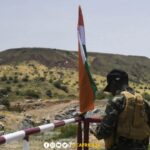On Monday, Morocco observes the 44th anniversary of recovering Oued Ed-Dahab from Spanish occupation. On this day in 1979, representatives consisting of scholars, dignitaries, notables, and tribal leaders from Oued Ed-Dahab presented a declaration of allegiance to the late King Hassan II. This declaration signified their strong affiliation with Morocco and commitment to its territorial integrity.
Since then, the issue of the Moroccan Sahara has taken a series of paths, from international settlements to the diplomatic gains that the case has achieved today.
International Settlements
After the recovery of the Valley of Gold region, the Sahara issue will witness a series of transformations, beginning with the path of international settlement beginning with the African decision based on it in June 1983 by the Organization of African Unity, after the Secretary-General of the United Nations in 1985, in cooperation with the Organization of African Unity, sent a mission of good offices.
The settlement proposals were accepted on August 30th, 1988, by Morocco and the Polisario Front. In 1990, the Security Council adopted the report of the Secretary-General of the United Nations, which included the full text of the settlement proposals and the framework of the Secretary-General’s plan for their implementation.
Thus, in 1997, the position of the Personal Envoy of the Secretary-General of the United Nations in the Sahara will be created, James Baker will assume a political position that will discuss ways to find a political solution to the conflict in the Sahara, after the difficulty of holding the referendum was confirmed, so that the UN envoy would suggest the third solution, which Morocco will translate as the autonomy proposal.
Autonomy Proposal
The autonomy proposal came as a political solution to the fabricated conflict over the issue of the Moroccan Sahara. It was proposed by Morocco in 2007, and this proposal is based, according to the text of the Moroccan initiative, on Morocco’s engagement in a positive and constructive dynamic committed to presenting an initiative to negotiate a system of autonomy for the Sahara region, within the framework of the Kingdom’s sovereignty and unity.
This initiative also falls within the framework of building a modern democratic society, based on the foundations of the rule of law, individual and collective freedoms, and economic and social development. The proposal narrows down, and since then the initiative has received several recognitions.
International Recognitions
Since the adoption of the autonomy proposal, the issue of the Moroccan Sahara has gained credibility at the international level, embodied by the succession of recognitions. The most prominent of these steps was the American recognition of the Moroccanness of the Sahara, followed by the Spanish decision that confirmed the seriousness of the Moroccan proposal for the Moroccan Sahara, as Spain considered that the “autonomy initiative” presented in 2007 by Morocco is the most serious, realistic and credible basis for resolving this dispute.
The last episode of international recognition was the Israeli recognition of the Moroccanness of the Sahara, as King Mohammed VI received a message stating that “the State of Israel recognizes Morocco’s sovereignty over the territory of Sahara, and that Israel will inform the United Nations and regional and international organizations of which Israel is a member, as well as all Countries with which Israel has diplomatic relations with this decision.







